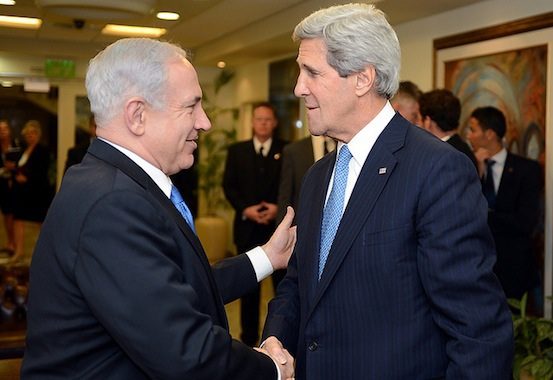The Kerry Peace Mission: An Unbalanced Balancing Act

Like many committed to a just solution to the Israel-Palestine conflict, I feel an ambivalence about the John Kerry mission. The leaked contours of the “framework” agreement seem lopsided in favor of Israel, especially if Israel is allowed to keep the major settlement blocs of Ariel and Ma’ale Adumin. These settlements were designed in part to divide the West Bank into non-contiguous cantons and to cordon off Jerusalem from major Palestinian population centers—i.e., to prevent a viable Palestinian state.
Nevertheless, Abbas and the Palestinian Authority may be sufficiently worn down by the peace process to accept less than a viable state. Abbas has limited legitmacy—his party lost the last election (in 2006) it allowed to take place. But other Palestinian options are not great: they can embark on a long game, hoping that the boycott and divestment movement (BDS) against Israel continues to grow, and that an internationally isolated Israel will be compelled to negotiate on a more level field. But that’s a generation-long struggle, with no certain result. Meanwhile the degree of Palestinian suffering right now should not be underestimated; the Israeli occupation regime of checkpoints, home demolitions, imprisonment without trial, destruction of water resources, settlers destroying Palestinian crops with impunity, etc. is a constant grinding pressure on Palestinian life, and the rationale for any Palestinian leader to make a deal that could alleviate much of it is obvious. To be added, of course, are the blandishments of possible enrichment through crony capitalism: you can be sure that every member of the extended families of every key Palestinian negotiator are aware that a signed deal might put them squarely in the path of an international money stream. The Palestinians long ago agreed to accept half a loaf—a state on the West Bank and Gaza and a shared Jerusalem. Will they now go for the quarter loaf—a trisected and unviable territory they can call a state, in lieu of something better?
For his troubles, Kerry has received unprecedented abuse from the Israel right, a reaction which illuminates how little Israelis think of the United States as any sort of genuine ally. The composition of his negotiating team, described in some detail in a recent article in the Guardian, implicitly acknowledges that his mission is based almost entirely on placating the American Israel lobby and critics on the Israeli right: not only does it lack any Arab-Americans, or Muslims of any sort, but also seems astonishingly thin on American Catholics and Protestants. As a team which “looks like America” it certainly fails, but it is likely that the key constituencies in Congress and public opinion which have to be brought on board probably don’t care that it doesn’t. Kerry needs to be able to state that his diplomacy is good for Israel, and has negotiated accordingly. Even so, it’s not clear whether he will get Israel to agree to the terms he proposes. But if he does manage to produce an agreement loaded in Israel’s favor and squeeze acquiescence to it from Abbas, it remains an open question whether it will actually resolve the conflict, or be vulnerable to campaigns to reopen the negotiations, which will seem more reasonable as recognition of the unviability of what the Palestinians have actually gained inevitably sets in.
Comments